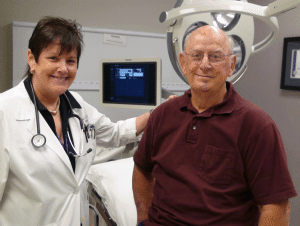Dumas Man on a Mission About Male Breast Cancer
| June 26, 2012 | “You can do it in private. Nobody needs to know you’ve examined yourself. It’s a no brainer. If guys get breast cancer,” Gerry Vickers, 72, said, “why not feel once in a while?” The Dumas resident, who says he “never had any kind of tickle or an itch,” found his own acorn-sized mass one night sitting alone in his den. An educational TV program about a Race for the Cure event mentioned that, while unusual, men can get breast cancer. Vickers had just weeks earlier met a young man at a lakeside park who said his father had died of breast cancer. “My faith has deepened,” Vickers said about his post-mastectomy life. “I genuinely think I was being given a message” to perform a self-exam. Now he is on a mission to encourage every man he meets to perform self-exams. Breast cancer is not something most people even associate with men. “It’s kind of embarrassing to me because I’m a United States Marine, and Marines don’t get breast cancer,” Vickers said, smiling. What’s more, pink ribbons and the color pink, two things more closely associated with femininity, are used in breast cancer public awareness campaigns. (A pink and blue ribbon is often used to signify male breast cancer.) V. Suzanne Klimberg, M.D., director of the Winthrop P. Rockefeller Cancer Institute Breast Cancer Program at the University of Arkansas for Medical Sciences (UAMS), says for every 100 women who get breast cancer, one man will get breast cancer. Klimberg, co-author of the biggest study yet in males, said “on average, women with breast cancer lived two years longer than men. Our study indicates that this may be because men were diagnosed with larger tumors that having been found later were more likely to be advanced and already spread to other parts of the body.” Klimberg, president of the American Society of Breast Surgeons and the Muriel Balsam Kohn Chair in breast surgical oncology at UAMS, diagnosed Vickers’ breast cancer and performed his mastectomy. (Vickers was not a part of the male breast cancer study.) There are no formal guidelines for detecting breast cancer in men. The main thing for a man to screen with is his hand. While research on men’s breast cancer is scant, it appears that the same factors that affect a woman’s chance to develop breast cancer, such as age, genetics and family history, also play a part in whether men will develop the disease. Today, Vickers has full use of his arm, but since the surgery removed the fat above his ribs on his left side, he’s more sensitive to cold when he’s hunting. “I am very fortunate to have a doctor like Dr. Klimberg at UAMS because they did a wonderful job. Our doctor at home did the biopsy and then referred us. We asked him to refer us here because UAMS is the apex of cancer treatment in the state.” |
